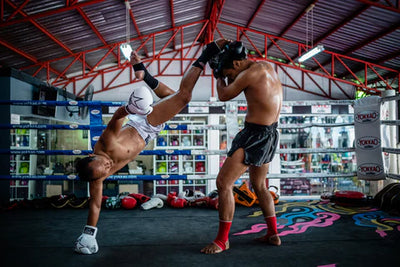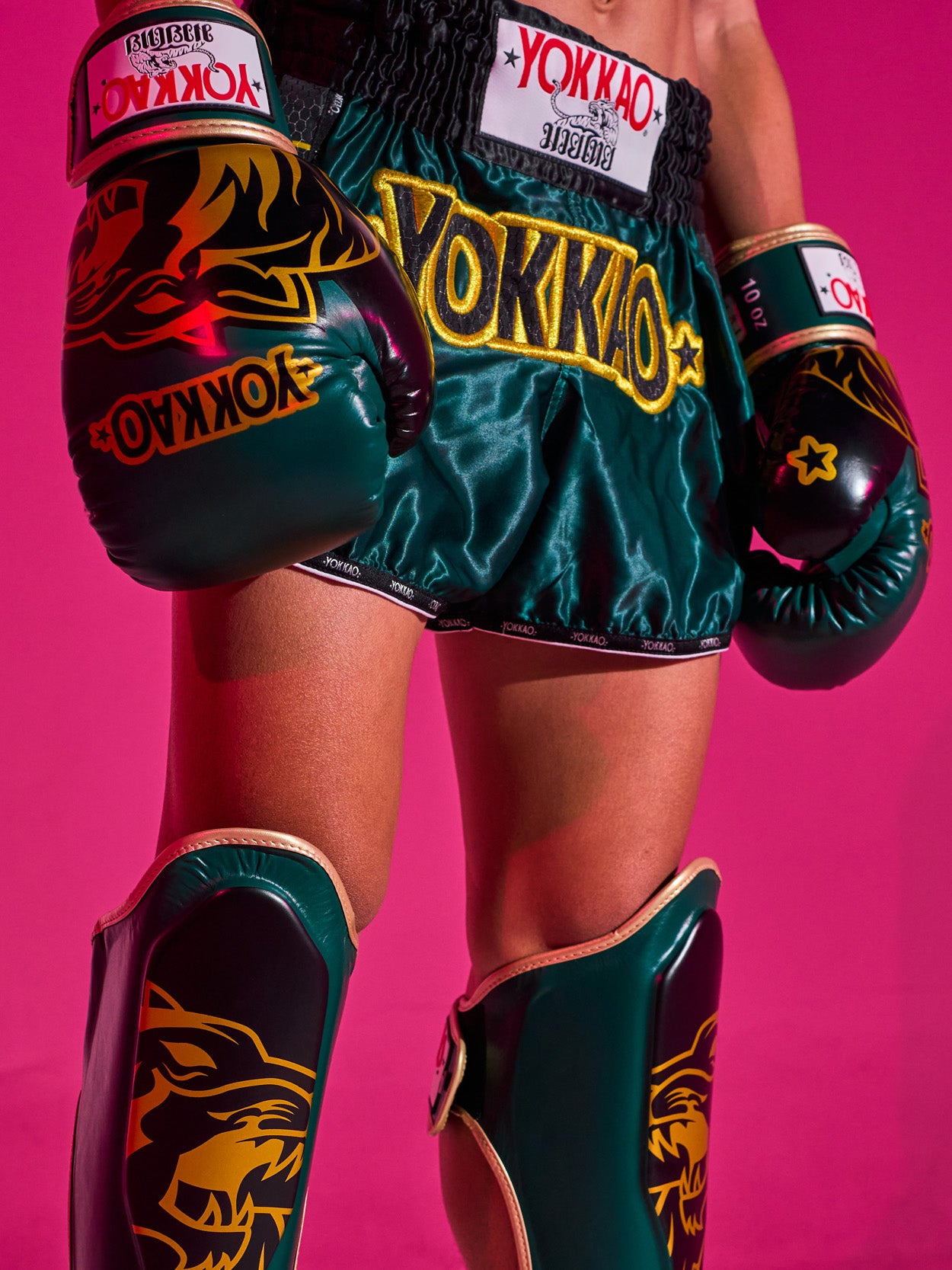KICKBOXING
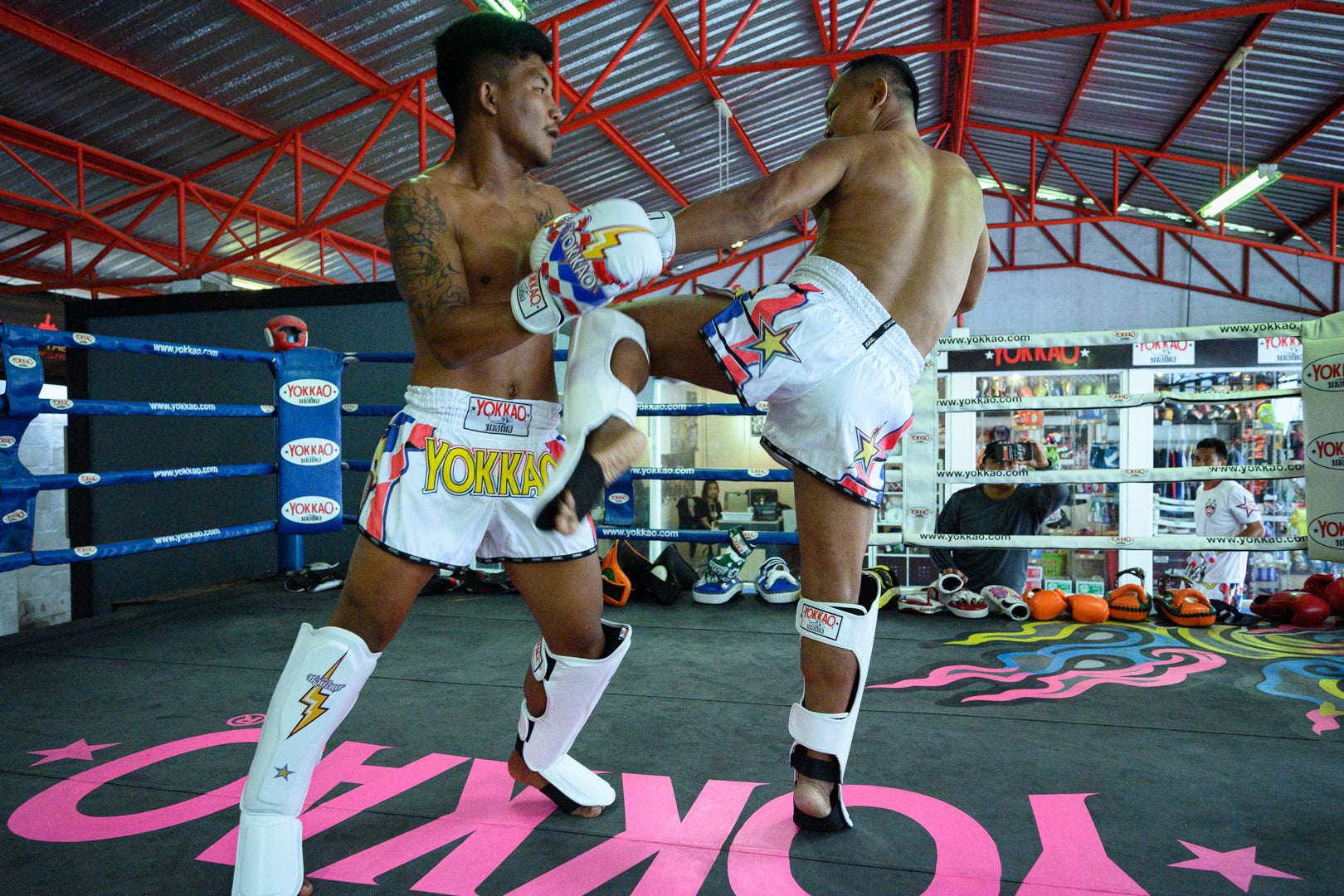
Introduction
Kickboxing is one of the most popular combat sports around the world. Kickboxing derives its name from classic boxing as it incorporates punching and other striking techniques. There are different styles of kickboxing including Dutch-style, Karate, Sanda, Kun Khmer and Muay Thai.
Today, kickboxing is practised for competitive, fitness and recreational purposes by all ages, genders and nationalities. Many movies about kickboxing sports have also been produced over the years, most notably, Jean Claude Van Damme’s Kickboxer and Bloodsport.
To help you learn more in-depth about kickboxing, we will go into detail in this special feature to discuss its history, benefits, competitive rules, as well as the difference compared to boxing and Muay Thai.
What Is Kickboxing?
As its name suggests, kickboxing is a striking style that incorporates punches and kicks. In reality, it is an umbrella term for a wide range of combat and martial arts styles.
The essence of kickboxing is that it is a stand-up fighting style. This is to say that it focuses on striking and there is no ground fighting involved. The range of techniques depends on the individual type of kickboxing style. Other than standard punching techniques similar to western boxing, kickboxing techniques typically include kicks and knee strikes. Some kickboxing styles involve elbow strikes, some grappling and even headbutts.
Modern kickboxing sports as seen on K-1, Glory or One Championship adopt a very similar set of rules allowing punches, kicks, with limited grappling/clinching.
What Is Kickboxing Good For?
Kickboxing is practised for a variety of reasons. Many mixed martial artists take up kickboxing as their striking base for its effectiveness. Beyond competitions, it is good for overall fitness, self-defense, and weight loss.
What Is Cardio Kickboxing?
Cardio kickboxing is a non-competitive, aerobic fitness exercise that incorporates kickboxing techniques and movements. It is a cardiovascular-focused exercise inspired by the kickboxing sport with less impact and involves no sparring. Cardio kickboxing is a popular fitness exercise that is practised around the globe.
History Of Kickboxing
Kickboxing martial arts date back to many centuries ago. Muay Thai and other Southeast Asian martial arts were designed for unarmed combat on battlegrounds with records dating back to around the 12th century. Karate was developed around the 17th century and was introduced into Japan in the early 20th century.
The earliest records of competitive kickboxing dates back to around the 16th century when interest in Muay Thai as a sport occurred. However, there were not many rules or regulations in place. Fights were sanctioned with no restrictions over weight classes or protective gear.
Kickboxing as a combat sport has a more recent history. Muay Thai transformed into a modern sport around the 1920's when it included elements from western boxing such as boxing ring, boxing gloves, referees and rounds/time limits.
Kickboxing took on a separate development in East Asia in the form of Kyokushin Karate around the 1950’s. This further evolved into Japanese kickboxing when it merged elements of Kyokushin with Muay Thai. As Japanese kickboxing grew in prominence and influence, the sport took on different identities in western part of the world with American and Dutch kickboxing.
During the 70’s and 80’s, kickboxing tournaments between different forms of kickboxing styles were held. By 1993, the Japanese kickboxing organization, K-1 was founded as a unified-rules kickboxing promotion. Competitors from all over the world landed in Japan to pit their skills and determine the best kickboxing style.
By the late 1990’s and early 2000’s, K-1 became the dominant kickboxing organization. All modern kickboxing promotions today adopt rules developed during the K-1 golden era.
Kickboxing Techniques
Kickboxing techniques as allowed in international kickboxing competitions include punching, kicking, knees and limited clinching. Some of the more kickboxing techniques for beginners include standard jab-cross punches, roundhouse kicks and straight knees.
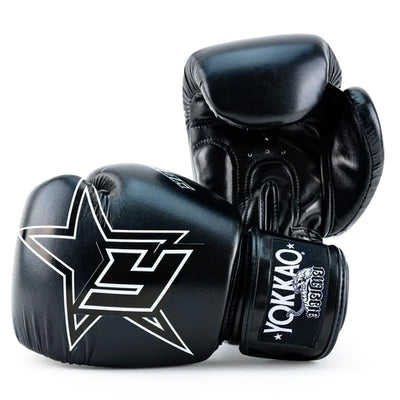
INSTITUTION BOXING GLOVES
- Microfiber Leather
- 100% Handmade in Thailand
- Embroidered YOKKAO Logo Patch
- Multi Layered foam padding
- Handcrafted by Thai Professionals in Thailand
- Hook-and-loop Closure
Let’s look at these techniques in more detail.
Punches
Punch techniques in kickboxing are inherited directly from classic boxing. Basic punch techniques include the jab, straight/cross, uppercut, and hook. Some of the more advanced punch techniques are spinning backfist, and superman punch.
Punches can be thrown directly to the face, temples, chin, jaw, ribcage, liver, and abdomen. It is illegal to punch the back of the head, or the throat.
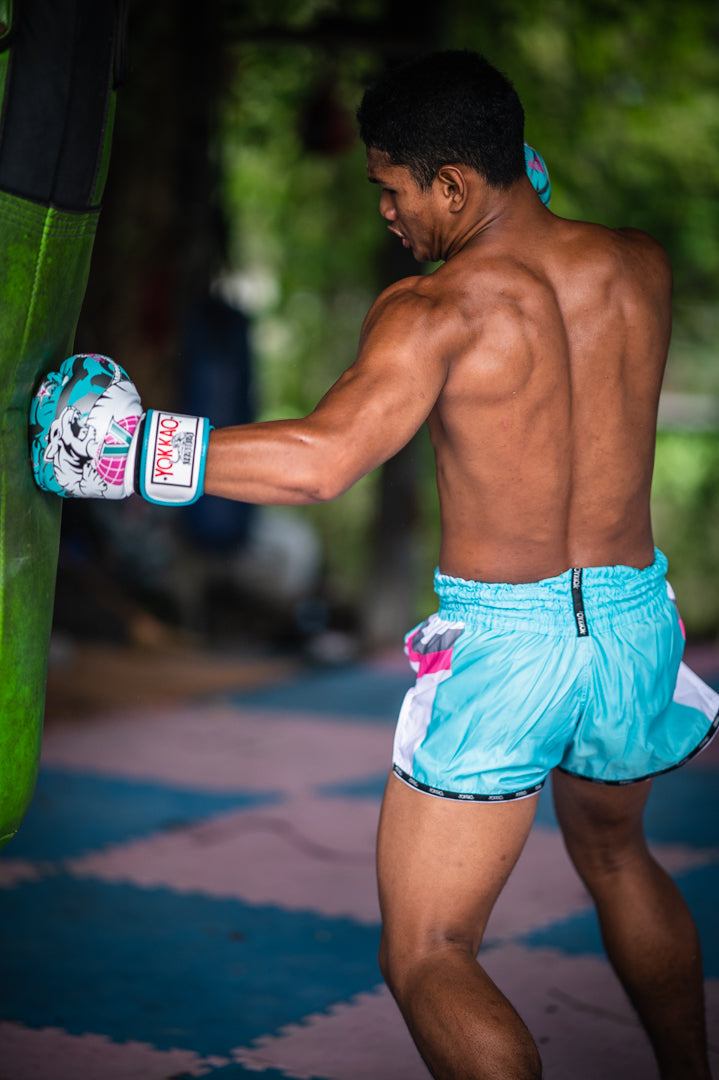
Kicks
Kicks are the long-range weapons of kickboxing.
There are many variations of kicking within each style of kickboxing. The basic kicking techniques in kickboxing include the roundhouse body kick, high kick, and leg/low kick. More advanced kicking techniques include the spinning back kick, axe kick, jump kick, flying kick and cartwheel kick.
Most kicks are used offensively. The teep or push kick is a defensive move that is thrown to the solar plexus, abdomen or face to disrupt an opponent’s rhythm but can also be used offensively.
Kicks are thrown to the ribcage, arms, head, neck, legs and back. Groin kicks are usually illegal in most fighting sports even though accidents happen regularly.
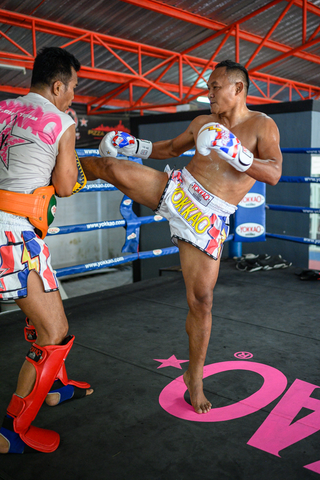
Knees
Knee strikes are delivered with the kneecap or surrounding area. They can be effectively used in short, mid- or relatively long-range.
Basic knee techniques include straight knees and diagonal knees, Knee strikes target the sternum, abdomen or ribcage. A more advanced knee strike is the flying/jumping knee which targets the head for more devastating effect.
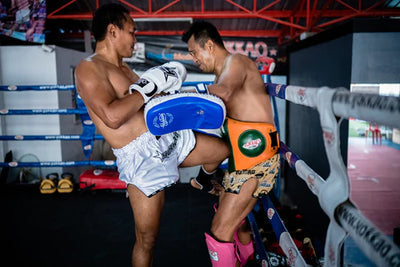
What Are The Benefits Of Kickboxing?
Let’s explore the health benefits of kickboxing workouts as well as other benefits from training kickboxing.
Better Fitness
If you are looking to get fitter and stronger, kickboxing is an ideal exercise to take up. Kickboxing training is a full-body workout that is both cardio and muscular intensive. With regular kickboxing training, better fitness is not a matter of if, just a matter of when.
Weight Loss
Kickboxing workouts usually last 1-2 hours, and may burn up to 1000 calories each session. With a balanced diet, regular kickboxing training can be a great addition to any weight loss plan. There aren’t many exercises that are as effective as kickboxing in burning calories.
Self-Defense
When you take up kickboxing, you will effectively learn combat skills. Kickboxing is an all-rounded fighting style that has both long-range and short-range striking techniques. It also covers offensive and defensive movements. When there is no way to run, knowing how to fight is a life skill worth having.
Stress Relief
Besides seeing fitness improvements, kickboxing benefits can also be mental or psychological. Kickboxing is an intensive exercise that triggers positive feeling as a result of endorphins secretion within the brain and nervous system after working out. This helps in stress management, helping to relax and improves sleep quality.
Builds Confidence
When you get fitter and look better, seeing improvements over time, your self-confidence naturally improves. Additionally, knowing that you are able to protect yourself with self-defense skills adds to that confidence.

Kickboxing Vs Boxing
Although kickboxing is heavily influenced by boxing, both combat sports are distinctly different. Let’s look at the difference between boxing vs kickboxing.
The most apparent distinction is the wider range of techniques in kickboxing. Kicks and knees make kickboxing a more complete and dynamic fighting style than just hands in boxing. There are more techniques to learn and master in kickboxing compared to the suite of punching techniques in boxing.
While footwork is pivotal for both sports, pure boxing utilizes head movements more than kickboxing. Kickboxing relies more on blocks for defense as there is a wider range and angles of attacks to guard against.
This is not to say one style is better than the other. One powerful and precise punch to the jaw may be all it takes to knock someone out whereas kickboxing has more weapons at disposal.
In street fights, speed is critical and so boxing can have advantages over kicking. However, kickboxing has become a more all-rounded striking base for mixed martial arts. Kickboxing is also a more complete exercise regime that provides both upper and lower body conditioning making it for fitness purposes.
Kickboxing Rules
Like all combat sports, kickboxing competitions are governed by rules and regulations. Here are some of the key and fundamental rules in kickboxing as adopted by the top kickboxing promotions in the world:
Attire
Kickboxers wear shorts with no tops (men) or a sports bra (women). Shoes are not allowed in kickboxing unlike in boxing. Groin protectors and mouth guards are always worn for safety. In amateur kickboxing competitions, headguards may also be mandated.
Weight Divisions
Competitors are grouped into different weight classes so they fight only against opponents in the same weight division. This categorization makes it fairer for athletes as a heavier weight is an advantage in combat situations.
Rounds
Kickboxing bouts usually last for 3 rounds of 3-minute duration with championship bouts lasting 5 rounds. In the case of a knockout, a winner is determined at that instance.
Referees/Judges
A referee is in charge of ensuring the safety of fighters and enforces the rules and regulations of the promotion for a fair fight. There are also -typically 3- judges outside of the ring who will score the fight. In the event where there is no knockout, the referee will gather the score cards from the judges to determine the winner of the fight.
Fouls
Some fouls in kickboxing include striking the back of the head, throat, and groin (repeatedly). Clinching is also limited in that a knee must be thrown immediately when clinching is engaged and allowed up to 5 seconds as long as there is attacking or counter-attacking. If both fighters engage in a clinch with no attack, the referee will break up the clinch.
Muay Thai Vs Kickboxing
Muay Thai is classified as a style of kickboxing. However, they are also two separate combat sports with distinct rules. So what’s the difference between Muay Thai and kickboxing?
There are some distinct differences between the two sports such as the use of elbow strikes and clinch fighting in Muay Thai. Elbow strikes can be devastating and are forbidden in all kickboxing promotions.
Kickboxing events became popular in the 90’s when they were televised around the world. As the shows catered to casual viewers, many of whom find clinching to be less exciting, clinching was kept to a minimum for fast-moving action.
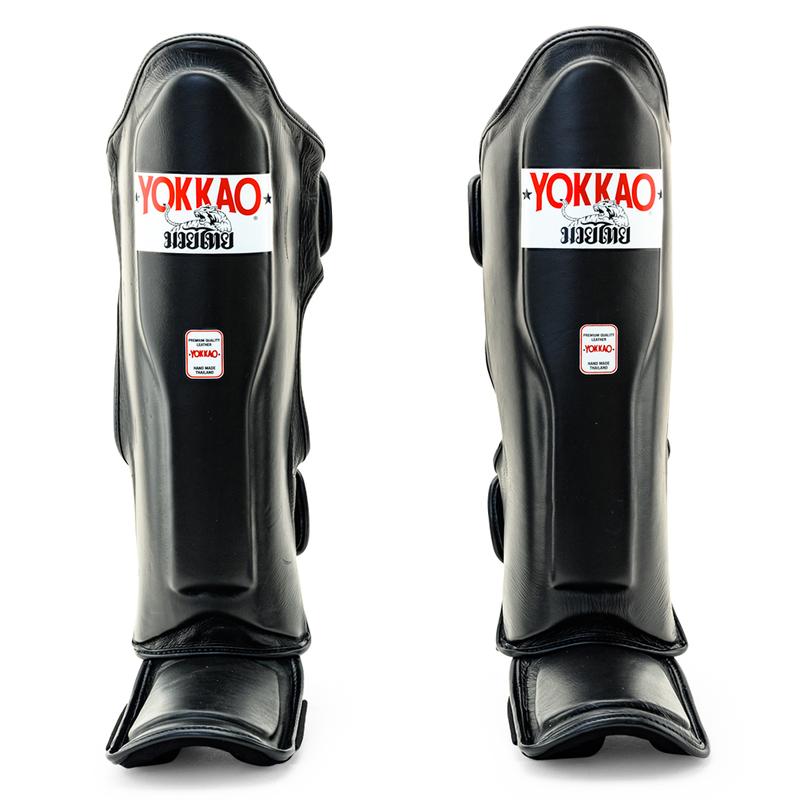
MATRIX BLACK SHIN GUARDS
- Constructed with triple layers of high-impact foam
- High-Quality Premium cowhide leather
- Unique design by YOKKAO
- Completely Handmade in Thailand
- Color-matching profiles
- Stress-resistant closure straps
- Improved comfortability
- Lightweight
- Non-slip interior for extra stability
- Remain steady during sparring
- Foot and knee protection
- This product is available also for kids
In terms of footwork, there tends to be more dynamic movement in kickboxing whereas Muay Thai seems more static and calculated. When the two styles are compared in terms of effectiveness, they each have their own set of advantages. Muay Thai has more weapons for short to long-range use whereas kickboxing has more dynamic movement.
Today, kickboxing and Muay Thai are adopted by competitors as well as fitness enthusiasts around the world.
